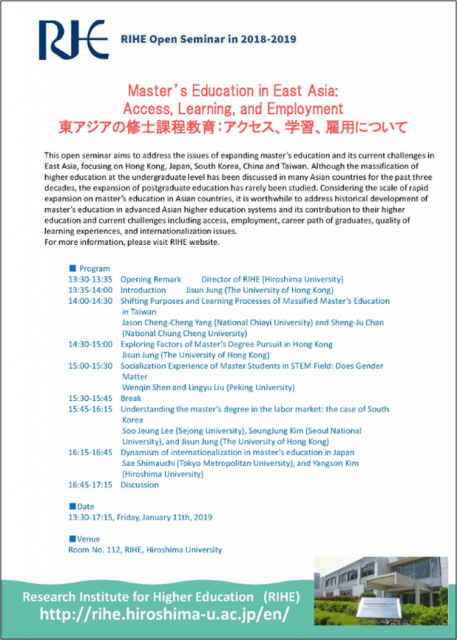The open seminar will be held as follows:
■Date
13:30-17:15, Friday, January 11th, 2019
■Venue
Room No. 112, RIHE, Hiroshima University
■Theme
Master’s Education in East Asia: Access, Learning, and Employment
■Abstract
This open seminar aims to address the issues of expanding master’s education and its current challenges in East Asia, focusing on Hong Kong, Japan, South Korea, China and Taiwan. Although the massification of higher education at the undergraduate level has been discussed in many Asian countries for the past three decades, the expansion of postgraduate education has rarely been studied. Considering the scale of rapid expansion on master’s education in Asian countries, it is worthwhile to address historical development of master’s education in advanced Asian higher education systems and its contribution to their higher education and current challenges including access, employment, career path of graduates, quality of learning experiences, and internationalization issues.
The seminar begins by describing the key changes in the higher education environment in relation to master’s education locally, regionally, and globally, and highlights major challenges of master’s education in each case country. Different issues in master’s education in each case higher education system will be presented and compared and common challenges will be discussed. For instance, master’s education in Taiwan will be discussed in the context of massified higher education and its shifting purposes and learning processes of master’s students will be suggested. In the case of Hong Kong, diverse factors including economic, social, academic, and cultural will be examined in students’ decision making in pursuing of master’s degree. Korean case will demonstrate whether master’s degree improves students’ employment outcomes or not and the results will be compared across the types of master’s programmes. A majority of students in master’s degree pursue doctoral degree and academic career path, thus, Chinese case will present what factors make the transition from master to doctoral level. Lastly, several master’s degree programmes in East Asia are currently recruiting many foreign students, and the Japanese case will show how internationalization affects master’s programmes and students’ educational experiences.
■ Program
13:30-13:35 Opening Remark Director of RIHE (Hiroshima University)
13:35-14:00 Introduction Jisun Jung (The University of Hong Kong)
14:00-14:30 Shifting Purposes and Learning Processes of Massified Master’s Education in Taiwan
Jason Cheng-Cheng Yang (National Chiayi University) and Sheng-Ju Chan (National Chung Cheng University)
14:30-15:00 Exploring Factors of Master’s Degree Pursuit in Hong Kong
Jisun Jung (The University of Hong Kong)
15:00-15:30 Socialization Experience of Master Students in STEM Field: Does Gender Matter
Wenqin Shen and Lingyu Liu (Peking University)
15:30-15:45 Break
15:45-16:15 Understanding the master’s degree in the labor market: the case of South Korea
Soo Jeung Lee (Sejong University), SeungJung Kim (Seoul National University), and
Jisun Jung (The University of Hong Kong)
16:15-16:45 Dynamism of internationalization in master’s education in Japan
Sae Shimauchi (Tokyo Metropolitan University), and Yangson Kim (Hiroshima University)
16:45-17:15 Discussion
■Language
English
[trust-form id=14225]

